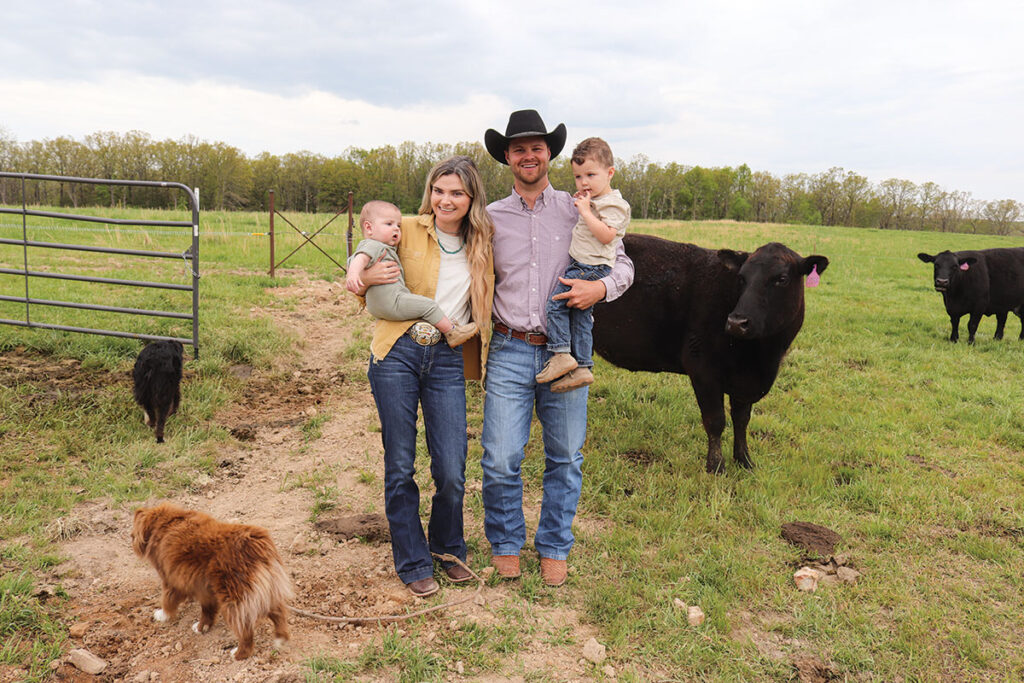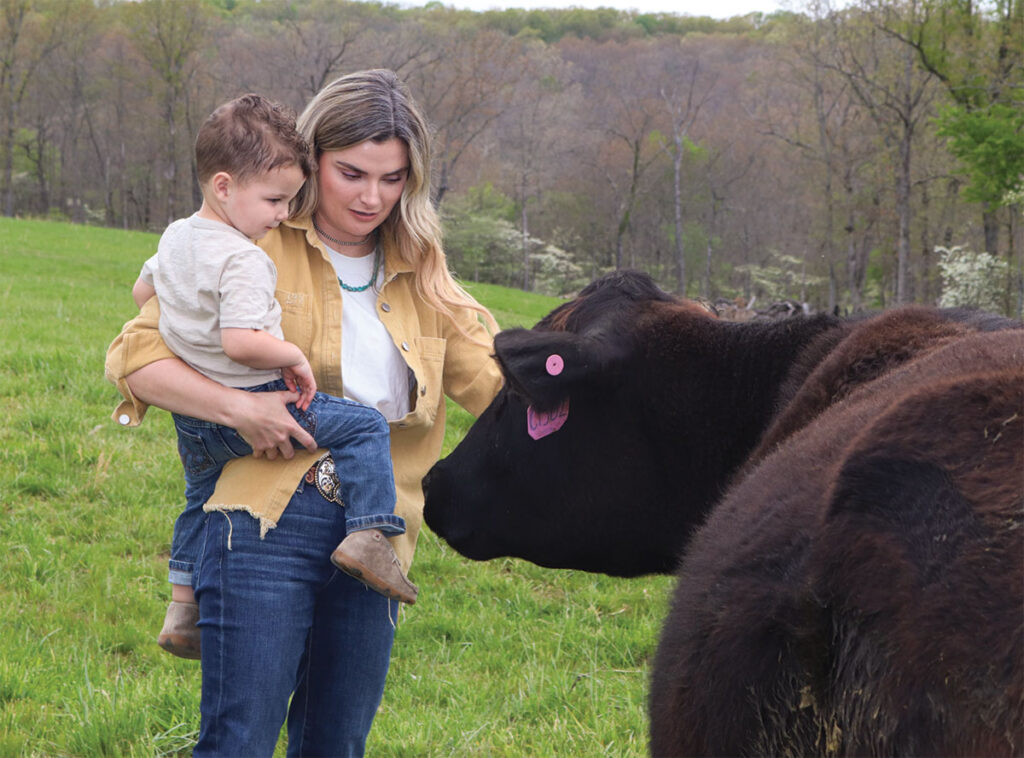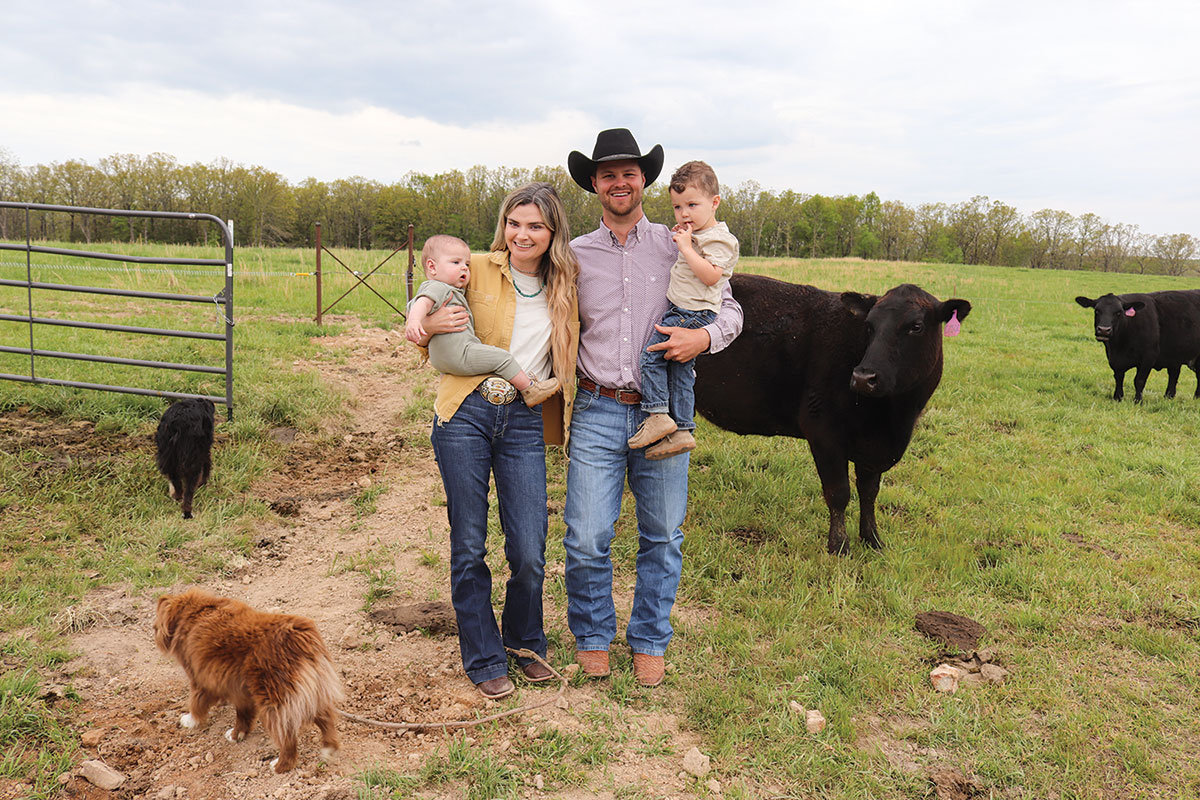
Ryan and Holly Shoffner want highly-fertile and highly-maternal females
MONTREAL, MO. – The cattle industry is nothing new to Ryan and Holly Shoffner.
Ryan’s family raised cattle in the Camden County, Mo., area, and Holly’s family raised Angus and Maine Anjou in Arkansas.
The couple, who met as students at the University of Missouri-Columbia, are now working to build their own herd and reputation.
“I worked for Cargill out of college and lived in west central Illinois,” Ryan said. “We moved back to (Holly’s) hometown in Northwest Arkansas, but we wanted to have our own farm.”
The couple left Arkansas and returned to Missouri. The move to their Montreal farm allowed the couple to start their cattle operation.
Ryan described the farm as “pretty run down,” over hayed and needed some TLC. It took some time before they could run cattle, but by 2021, Shoffner Cattle Company was in business.
They have carved out a paddock system for a 20-acre rotational grazing system, including the dozing of about 15 acres of wooded areas, with hopes to reclaim more land. They also acquired property across the road from their home that is cut for hay once a year, followed by strip grazing. In all, they have a total of 70 acres.
In addition to fencing and waterers, Ryan and Holly worked to improve soil fertility and no-tilled fescue and orchardgrass into the paddocks. They have also frost seeded clover.
When selecting a breed for their operation, the Shoffners opted for a breed they were familiar with.
“Angus is a good foundation, and you can breed anything to it to get what you want,” Holly said. “They are also highly marketable and have that good foundation.”
Shoffner Cattle Company currently runs 25 females and focuses production on high-quality females that are highly fertile, structurally sound and have eye appeal.
“You have to select good cattle, and you can’t go just with EPDs,” Ryan said. “Cows have to do their job first.”
Possessing the desired maternal traits is crucial for the Shoffners. They have an exclusively AI breeding program.
“We’re asking a lot from our cows from a maternal standpoint,” Ryan explained. “Not having bulls presents a set of challenges. Fertility is a big deal on our farm, and to get it done time after time without a clean-up bull, we need them to be highly maternal. We are also focusing on what a cow should look like, that phenotypical structure. Is she going to have the longevity we are going to require? We can’t be culling cattle out after just five years.”
Ryan and Holly added EPDs do have a place in their herd, but it’s not the main breeding factor.
“We want good EPDs for carcass merit, calving ease, and maternal traits, but we don’t want those traits if it doesn’t match the cow,” Ryan said. “We don’t want cattle with bad feet that you have to trim feet every year. We want a cow first and the quality that comes with those EPDs. We don’t want quality on paper and not see the quality in the pasture. You have to spend a lot of time with your cattle to see which one looks the best.”

Ryan credited Holly’s dad, Keith Bremer of Centerton, Ark., for his “eye” for quality females.
The Shoffners are not planning to get into the bull business and utilize sexed semen to get more heifers on the ground.
“There are a lot of producers who raise quality bulls and have a lot more head than we do,” Ryan said. “The larger facility you have, the more space you have to keep bulls. We don’t have the space to do that. Our focus is raising bred replacement heifers for seedstock or commercial producers.”
A total AI breeding program can be time-consuming, but when breeding for high-fertility females, the program works for the Shoffners.
Using sexed semen, Ryan explained, is also a marketing tool for their female-only operation because they offer females carrying females.
Another maternal trait the couple monitor is calf weaning weights.
“If a cow isn’t going to wean off a calf that can be bred in 14 months, she doesn’t have much room here,” Ryan said.
The next step in the breeding program is to look into embryo transfer. However, they plan only to flush females that have demonstrated the maternal traits they desire and are proven females.
Shoffner Cattle Company recently consigned bred heifers to the East Central Missouri Angus Association’s Spring Sale. Being a new consigner, Ryan and Holly said they wanted the quality to be its best and for the animals to look their best. When a long-time Angus breeder complimented them on their cattle, the couple said it was worth their efforts.
“The ultimate goal is to have a product, and I don’t think we’re far away, that will come with some name recognition,” Ryan said. “I want to have a product people will recognize as high-quality. If people know we have the quality they demand, I think that’s what the cow sales are all about.”
As for the future, the couple hopes to grow and expand.
Holly would like to increase their farm to about 200 acres and expand the cattle herd.
“If you have 10 head of a cow, you might as well have 50,” Ryan said. “At that point, we would still implement the tools and technology we have, but we might have to implement a clean-up bull with a herd that size. My dream has always been to have a large ranch and do that, but it’s hard to do that just starting out.”
“I remind him that we are starting from scratch and doing this on our own,” Holly said. “We get help and opinions, but this is truly ours.”







